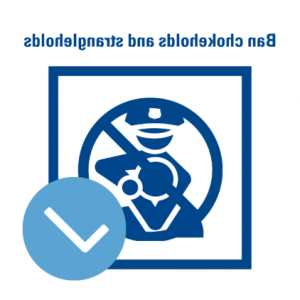8 Can’t Wait
After the murder of George Floyd in May of 2020, several police departments adopted the recommendations set forth at 8cantwait.org. Campus Police is committed to all 8 policies.


Chokeholds and strangleholds are considered deadly force and shall be avoided except when all other means to protect life have been exhausted. Reference GO-III-121

It is the policy of NCFPD that officers shall use only that degree of force which is necessary to halt aggressive actions and/or to overcome specific resistance in order to achieve a lawful objective and to protect themselves and the public from physical harm. When not confronted with an imminent threat, officers should gather additional information and consider other resources and options. De-escalation is the preferred, tactically sound approach in situations where time and circumstances permit an alternative to the use of force. As soon as subject compliance is reached, officers must de-escalate to the minimum force necessary to control the subject. All CPD members have received de-escalation training. Reference GO III-121 Page 2 POLICY and C3

The Campus Police Department requires all officers to provide a verbal warning, if feasible, in all instances involving deadly force. Reference GO III-121 E5e

The use of force decisions are made by officers based on rapidly evolving circumstances at the time of the incident. Officers may only use force that is objectively reasonable, necessary, and as a last resort when other reasonable alternatives have been attempted or would reasonably be ineffective in such circumstances. Reference GO III-121 Page 1 DISCUSSION

All members have a duty to intervene, to prevent, or to stop the use of excessive force by another member which occurs in their presence when it is safe and reasonable to do so. All members will immediately report excessive force to a supervisor. All supervisors have a duty to make prompt notification through the chain of command and make a written report before the end of their shift. Reference GO III-121 Page 1 DISCUSSION

Shooting at or from moving vehicles is prohibited unless all other reasonable means have been exhausted and the officer has a reasonable belief that the suspect poses a significant threat of death or serious physical harm to the officer or another person. Reference GO III-121 B5

Officers must complete an Incident Report and a Use of Force Report any time force is used. Reports must contain the officers who were present; any de-escalation efforts that were attempted; verbal commands used; use of force and resistance details; complaint of injuries; and what medical attention was provided to the injured. Reports will be reviewed pursuant to department policy. Reference GO III-121 G REPORTING USE OF FORCE

Officers must complete an Incident Report and a Use of Force Report any time force is used. Reports must contain the names of officers who were present; any de-escalation efforts that were attempted; verbal commands used; use of force and resistance details; complaint of injuries; and what medical attention was provided to the injured. Reports will be reviewed pursuant to department policy. Reference GO III-121 G REPORTING USE OF FORCE
Career Development & Training
BASIC COURSES
- 40 hours – Crisis Intervention
- 40 hours – Interview and Interrogation Techniques
- 40 hours – Advanced Report Writing
- 40 hours – Case Preparation & Court Presentation
- 40 hours – Stress Management
- 8 hours – Criminal Justice Officer Ethics
ADVANCED COURSES
- 40 hours – Adult Sex Crimes Investigations
- 40 hours – Determining & Evaluating: True Victims, False Allegations & Statements
- 40 hours – Advanced Report Writing & Review
- 40 hours – Narcotics & Dangerous Drugs
- 32 hours – Investigative Interviewing and Advanced Interrogation
- 16 hours – Ambush & Lethal Environment recognition Training (ALERT)
- 16 hours – Search and Seizure – Legal Aspects
These courses are in addition to annual/bi-annual training such as CPR/AED, Defensive Tactics, traffic crash and/or specialization courses as determined by the officer’s chain of command to meet the needs of the department.
BASIC COURSES
- 40 hours – Crisis Intervention
- 64 hours – General Instructor
- 40 hours- Officer Discipline/Internal Affairs
- 40 hours- Stress Management
- 80 hours- Line Supervision
- 16 hours- Search and Seizure – Legal Aspects
ADVANCED COURSES
- 40 hours- Advanced Middle Management
- 40 hours – Developing and Maintaining a Sound Organization
- 40 hours – Investigation & Supervision of Officer-Involved Deadly Force Incidents
- 8 hours – Tactical Leadership
- 40 hours – FBI LEEDA Supervisor (Trilogy – 120 Hours Total)
These courses are in addition to annual/bi-annual training such as CPR/AED, Defensive Tactics, traffic crash and/or specialization courses as determined by the officer’s chain of command to meet the needs of the department.
Police Activity Summary
These summaries show statistics for arrests and arrests by race/gender of officer and arrestee
- Arrest Summary
- Arrest Report 2018 by Race and Gender of Arrestee and Officer
- Arrest Report 2019 by Race and Gender of Arrestee and Officer
- Arrest Report 2020 by Race and Gender of Arrestee and Officer
- Arrest Report 01/01/21-03/31/21 by Race and Gender of Arrestee and Officer
- Traffic Citation & Warning Summary
- Suspicious Person Report 01/01/21-03/21/21
- Suspicious Vehicle Report 01/01/21-03/21/21
- Suspicious Person & Vehicle Grand Total Report 01/01/21-03/31/21
